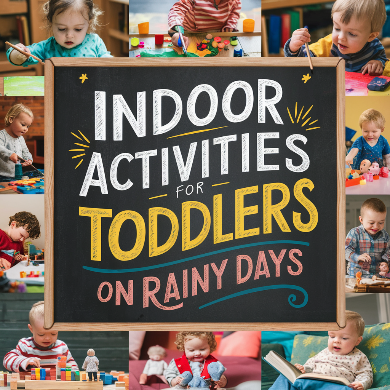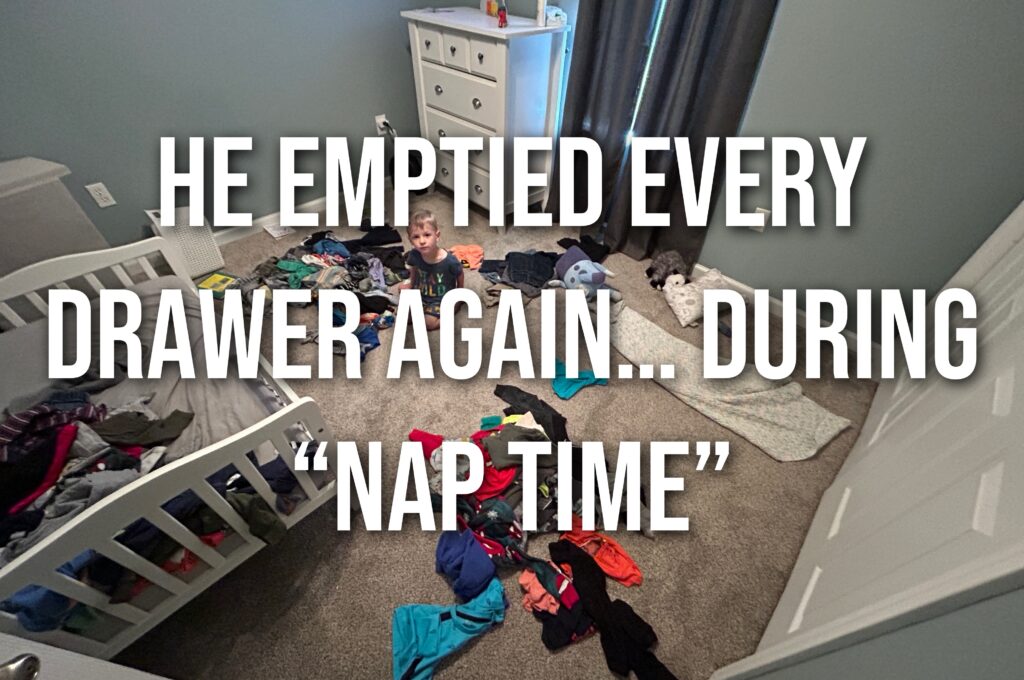
Why Does My Toddler Constantly Interrupt Me?
I swear, my toddler could be sitting quietly for 30 minutes—until I pick up the phone. Then suddenly, he has urgent business. Yelling, climbing me, repeating “Mom! Mom! Mom!” like we’re in a fire drill.
Sound familiar?
It’s like the second I try to have an adult conversation (or say two uninterrupted sentences), my toddler kicks into full-volume mode. At first, I thought it was just attention-seeking—and maybe part of it is—but there’s actually a whole lot more behind these constant interruptions.
Toddler interrupting isn’t just them being rude or controlling. It’s part of their brain trying to process emotions, seek connection, and navigate impulse control—skills that are still very much under construction.
And when I realized that, I stopped seeing it as them being “bad,” and started recognizing it as them being overwhelmed, confused, or simply trying to connect.
For example, if I was busy talking to another adult, he’d often tug at me until he had my full attention. And if he didn’t get it fast enough? Cue the meltdown. This guide to toddler tantrums and emotional blowups helped me see how often these interruptions are more about emotional overload than defiance.

What Toddler Interrupting Really Means (It’s Not Just Rudeness)
Let’s get this straight: toddlers don’t interrupt because they’re disrespectful. They interrupt because they literally don’t have the brain development yet to wait their turn, regulate their emotions, or remember that we’re not ignoring them.
Their world is super immediate. If they think something, they need to say it—right now. If they feel something, they needus to know—immediately.
Here’s what toddler interrupting is really about:
1. Lack of impulse control
Toddlers aren’t built to wait. The part of the brain that helps with self-control (the prefrontal cortex) is still under construction. That means waiting their turn to speak—or not yelling mid-conversation—just isn’t instinctive yet.
2. Fear of being forgotten
When you’re on the phone or talking to someone else, your toddler may fear they’ve lost your attention altogether. That panic can lead to louder, more intense interruptions. This article on clingy toddler behavior helped me see how those constant interruptions were sometimes just a need for security.
3. Craving connection
Interrupting isn’t always about demanding—it’s often about connecting. Your child wants to share their thoughts, emotions, or stories with you, and they don’t yet understand social timing.
4. Testing boundaries
Sometimes toddlers interrupt to see what happens. Do you stop? Do you respond immediately? They’re learning the rules of communication by watching our reactions.
I started noticing the pattern: if I gave him even five minutes of focused attention before getting on the phone, interruptions happened way less. And when they did? They were calmer.
Understanding that toddler interrupting isn’t rudeness—it’s development—completely changed how I responded.
More coming next: what this looked like in our house and how I handled the constant “MOM! MOM! MOM!” moments without totally losing my mind.

Our Experience With the “Talk Over Me” Phase
There was a stretch where I couldn’t make it through a single phone call, text, or even a quick “hello” to someone without my toddler launching into full-volume mode. It was like he had a radar for adult conversation—and once it activated, he made it his personal mission to shut it down.
I’d be halfway through scheduling a doctor’s appointment when suddenly he’d start yelling about a toy from three days ago. Or I’d sit down to respond to a work message, and boom—he needed a snack immediately (even though he was literally eating five minutes earlier).
It honestly felt like a form of sabotage. But after reading more about toddler brain development, I realized what felt like sabotage was actually his way of reconnecting when he saw my attention shift away.
Interrupting became his signal: “Hey! I don’t know what’s going on, but I need you right now.”
Once I shifted my view from disrespect to developmental need, it helped me calm down… a little. I stopped taking it personally and started seeing these moments as cues. Cues that he needed reassurance, structure, or just help expressing what he was feeling.
And during those weeks when he wouldn’t let me finish a single sentence without talking over me? I’d remind myself that I wasn’t alone. This story about the exhaustion of parenting hit me hard—because sometimes, the hardest part isn’t the noise… it’s the mental load that comes with it.

Why Toddlers Struggle With Impulse Control
The big reason toddlers interrupt so much?
They literally can’t help themselves.
Impulse control—the ability to stop, wait, or pause—is something that takes years to develop. The prefrontal cortex (the part of the brain responsible for that skill) doesn’t start kicking in until around age 4 or 5, and even then, it’s a slow build.
So when your toddler blurts something out mid-sentence, or yells “MOM!” thirty times while you’re just trying to say hi to another adult—it’s not them being rude.
It’s them being developmentally on track… even if it drives us absolutely bonkers.
What helped us:
1. Practicing turn-taking during play
We’d take turns building blocks, coloring, or playing with cars. That practice made it easier to apply the same idea to conversation: “It’s your turn to talk… now it’s mine.”
2. Using a gentle “hand on my arm” cue
Instead of yelling “MOM!” every two seconds, I taught him to place his hand on my arm when he wanted to talk. When I felt it, I’d wrap my hand over his and let him know I’d respond as soon as I could. It didn’t always work—but when it did, it was gold.
3. Narrating what was happening
If I was busy, I’d say, “I hear you, I’ll listen as soon as I finish this sentence.” It helped him feel acknowledged and reduced some of the panic that made him interrupt in the first place.
4. Giving him space to talk, too
Toddlers interrupt more when they feel unheard. So I started setting aside time where he got to talk without me multitasking or rushing him. And wouldn’t you know it—when he felt seen, he interrupted less.
If your toddler constantly cuts you off, keep this in mind: they’re not trying to make your life harder. They’re trying to figure out where their voice fits. And like most things with toddlers, understanding their behavior is often the first step toward managing it.

When Interrupting Becomes a Cry for Attention
I used to think my toddler interrupted me just to be annoying. I mean, why else would he wait until I finally started a conversation with another adult before shouting “MAMA LOOK!” on repeat like a broken record?
But eventually, I realized: the interruptions weren’t about control. They were about connection.
Toddlers don’t really understand the difference between “good” attention and “frustrated” attention—they just know they want your attention. And if they’re not getting enough of it (in a way that feels meaningful to them), they’ll find any way to grab it. Even if that means constantly talking over you while you’re trying to have a grown-up moment.
Here’s what clued me in:
- Interruptions happened way more often on busy days when I was distracted or emotionally checked out.
- They came in stronger when I was on the phone—which, to a toddler, looks like you’re talking to no one. They don’t get that you’re interacting with someone they can’t see or hear.
- Sometimes they weren’t even “real” interruptions—he just wanted to make noise near me because he felt disconnected.
Once I started giving my toddler more undivided time earlier in the day—before the chaos started—the interruptions dropped dramatically.
Try this:
1. Build in “connection moments” throughout the day
I made it a goal to spend 10 focused minutes with him at key transition times: after waking up, before lunch, and before dinner. When I was present during those windows, he didn’t feel like he had to fight for my attention later.
2. Narrate your availability
If I was cooking or folding laundry, I’d say, “I’m busy right now, but when I’m done, I can’t wait to see what you made.” It helped him understand that I wasn’t ignoring him—I was just momentarily unavailable.
3. Praise waiting behavior
Whenever he didn’t interrupt, I’d praise it: “You waited so patiently while I finished talking—thank you!” Positive reinforcement worked better than any lecture.
Interrupting is often just a toddler’s clumsy attempt to feel close to you. This article on clingy behavior helped me realize how often our kids’ “annoying” actions are just them trying to reconnect.

How I Responded Without Losing My Cool (Most Days)
Look—I’d love to say I always responded with gentle redirection and endless patience. But in real life?
Sometimes I snapped. Sometimes I said, “Can you PLEASE just give me 30 seconds?!” louder than I meant to. And then I’d feel guilty. Because it wasn’t his fault. He was learning. And honestly? So was I.
But over time, I did find some responses that helped reduce interruptions without damaging connection:
Here’s what worked best for us:
1. A simple hand signal
I’d hold up one finger (kind of like “give me a sec”) while finishing my sentence. Then I’d make eye contact and say, “Okay, now I’m listening.” Over time, he learned that the signal meant, “Not yet, but soon.”
2. Practicing “talking turns” during play
We’d take turns describing our toys or telling a story. It made the concept of waiting more familiar—and fun.
3. Using picture books to explain waiting
There are a few great toddler books about patience and listening. Reading those together helped us talk about the idea in a calm setting, rather than mid-interruption meltdown.
4. Letting go of perfection
Some days went smoothly. Others didn’t. And that’s okay. This honest look at parenting doubts reminded me that no one handles it perfectly—not even the so-called “experts.”
If you’re knee-deep in a phase where your toddler won’t let you finish a sentence, take heart. They will grow out of it. But in the meantime, you’re not failing for getting frustrated—you’re just human.

Teaching Boundaries Without Shaming
One of the hardest parts of parenting through the toddler interrupting phase was figuring out how to set boundaries without crushing my kid’s spirit. I didn’t want to shut him down or make him feel like his thoughts didn’t matter. But I also couldn’t live in a world where he screamed over every adult word I tried to say.
What finally clicked?
Boundaries and kindness can exist at the same time.
Toddlers thrive on consistency. And just like we teach them not to throw food or hit when they’re mad, we can also teach them how to participate in conversations respectfully—without making them feel small for getting it wrong.
Here’s what helped me walk that line:
1. Use scripts they can remember
We’d practice phrases like “Excuse me” or “Can I tell you something?” and role-play what it looked like to wait while someone else was talking. It wasn’t perfect, but repetition helped it stick.
2. Correct calmly (most of the time)
Instead of snapping, “Stop interrupting me!” I’d try to say, “I’m still talking right now, but I want to hear you next.” It reminded him that his voice mattered, but timing matters too.
3. Catch the good moments
When he waited (even for 5 seconds), I’d say, “I really appreciate how you waited for me to finish. That was awesome.” Positive attention for the behavior I wanted helped reinforce it way more than scolding ever did.
4. Keep your expectations realistic
Toddlers are going to interrupt—it’s part of how they learn. But they can also learn what’s okay and what’s not, especially if you model it consistently.
And yeah, on the days when I was trying to parent and keep the house clean and take a phone call without 17 interruptions, it was hard not to snap. This article about parenting exhaustion kept me grounded when I felt like I was losing patience every five minutes.

When Toddler Interrupting Affects Other People
It’s one thing when your toddler interrupts you—but when they start talking over teachers, neighbors, or other adults? Whew. That’s when the public embarrassment starts creeping in.
I’ve definitely had moments where I wanted to crawl under the table. Like when my toddler interrupted an adult conversation at church to yell, “I TOOTED!” and then refused to stop repeating it for five minutes straight.
Those moments are funny in hindsight. But in the moment? They’re stressful. And they made me wonder: Am I failing to teach manners?
But here’s the truth I had to keep reminding myself:
Interrupting is not a sign of bad parenting—it’s a sign of normal toddler development.
Still, there are gentle ways to help your child navigate social settings without constant correction or shame:
Try this:
- Before entering a situation, set expectations: “We’re going to talk to Miss Sarah. If you need to say something while I’m talking, remember to put your hand on my arm.”
- Give them a small “job” to focus on, like holding your bag or counting something they see. Having a purpose can help minimize interrupting.
- Afterward, debrief in a loving way: “You were excited to talk today, huh? Next time, let’s try using our hand signal again so we don’t talk over people.”
Toddlers don’t have filters, and they definitely don’t have timing. But they do have the ability to learn—with repetition, patience, and lots of grace.
And for those moments when you just need to laugh or cry it out, this parenting story about talking to kids reminds me I’m not the only one trying to talk over a toddler tornado.

When to Worry About Constant Interrupting
Most of the time, toddler interrupting is a totally normal part of growing up. They’re still learning how conversations work, they don’t quite understand timing, and their little brains are bursting with thoughts they have to get out right now.
But sometimes, the interruptions feel different. They’re louder. More frantic. Or they seem to happen so constantly that you start to wonder—is this still typical toddler behavior?
Here’s when I personally started paying closer attention:
1. When my toddler couldn’t handle silence
Even in calm moments, if there was no conversation happening, he’d start filling the space by repeating the same phrase over and over. It wasn’t just interrupting—it felt more like anxiety bubbling up.
2. When interrupting was paired with big emotional outbursts
It wasn’t just “Mommy, look!”—it was full-blown panic or meltdowns if I didn’t respond instantly. In those cases, the interrupting was less about communication and more about emotional regulation struggles. This breakdown on after-school meltdowns helped me realize how overwhelm plays a huge role in behavior.
3. When it started affecting friendships or group settings
If your child constantly interrupts during story time, playdates, or preschool and can’t stop—even with gentle guidance—it might be time to chat with their teacher or pediatrician. Not for judgment, but for support.
4. When there were zero improvements over time
Most toddlers get slightly better at taking turns and waiting with age. If that’s not happening at all—if the behavior is just as intense at 4 as it was at 2—it might be a sign they need some extra tools.
And sometimes, the behavior that looks like interrupting might actually be linked to something deeper, like ADHD, auditory processing issues, or social communication delays. If your gut is telling you something feels off, it’s okay to trust that.
That said? Most toddlers interrupt constantly. It’s how they learn. This article about understanding toddler behaviorreminded me that development is messy—and our job isn’t to perfect our kids, but to help them grow through it.

Encouragement for Parents Feeling Overwhelmed
If your toddler talks over you constantly, melts down when you’re mid-sentence, and seems determined to sabotage every phone call you make—you are not alone.
It’s exhausting.
It’s frustrating.
And sometimes, it feels endless.
But here’s the thing I’ve learned over and over again: this is just a phase. A very loud, emotionally demanding, test-your-patience kind of phase—but still, a phase.
Your toddler isn’t trying to annoy you. They’re trying to connect. They’re figuring out their voice, testing limits, and learning where they fit in this world of conversations and rules and adult interactions.
And guess what? You’re doing the hard work of teaching them.
You’re modeling kindness, setting boundaries, and loving them even when they’re shouting “MOM!” for the 37th time in one hour.
Even if today was a mess, and you lost your cool, and you hid in the bathroom for a few extra minutes—you’re still showing up.
And that matters.
So take a deep breath. Step away when you need to. And remember, they will learn.
One (interrupted) conversation at a time.

What Can I Have My Toddler Do While I’m on the Phone?
If I had a dollar for every time my toddler lost their mind the second I said, “Hello?” on the phone—I could probably buy a noise-canceling bunker and retire.
But I’ve learned this the hard way: toddlers don’t interrupt just because they’re bored… they interrupt because they don’t know what else to do when we’re not fully available. So I started coming up with a list of things he could do on his own—things that didn’t need constant supervision, but still felt fun and important to him.
Here are some real-life lifesavers that helped us get through a 10-minute call without a toddler takeover:
1. Give them something with wheels
Anything that moves keeps them focused. Sometimes, I’d say, “Go ride your trike to the mailbox and back while I call Grandma,” and that worked like a charm. If your kid loves to zoom around, check out our post on toddler tricycles—they’ve been total game changers.
2. Create a “phone time” busy bin
I keep a special bin of activities he only gets when I’m on a call—playdough, stickers, chunky puzzles, water painting. That novelty helped a ton. And if you need fresh ideas, this list of indoor toddler activities has so many gems that kept my little one entertained when I needed a moment.
3. Let them create something
A sheet of paper, crayons, and some tape = a masterpiece waiting to happen. I’d tell him, “Make me a surprise while I talk,” and boom—he’d go all in. These fun and easy crafts for kids became our go-to for screen-free, mess-contained fun.
4. Set a visual timer and challenge
I’d set a 5-minute timer and say, “Can you build the tallest tower before the bell rings?” Toddlers love a good mission—and it bought me time to finish a sentence or two.
5. Use audio or music distractions
Some calming music or even a toddler audiobook helped set the mood. He wasn’t always quiet, but he was less loud, and I’ll take that win any day.
It doesn’t work every time. And there are still days he climbs into my lap mid-call to announce his belly button is itchy. But having go-to activities for phone time helped us both feel more sane.
And if you’re in survival mode? You’re not failing. You’re parenting. Loudly.
(And hopefully with a strong coffee nearby.)

As an Amazon Associate we earn from qualifying purchases through some links in our articles.




